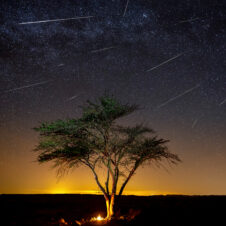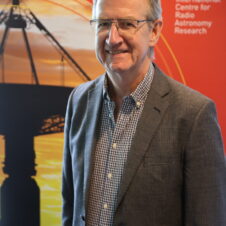Mix a creative writer with a computational astrophysicist, and you’ve got a recipe for a deeply personal exploration of darkness.
Measuring Darkness is a creative research partnership between Daniel Juckes, a lecturer in English and Literary Studies in the School of Humanities and Chris Power, of the UWA node of the International Centre for Radio Astronomy Research.
The collaboration began with a special issue of the creative writing journal TEXT, focusing on dialogues between creative practitioners and researchers in other disciplines.
Chris offered a prompt—an article he had published on stellar haloes and dark matter—and Daniel responded. ‘Measuring Darkness’ is the result: a dialogue that questions the future of darkness, and specifically the ways in which the invisible might be perceived or sensed. It takes on the metaphorical potential of Chris’s work in an attempt to bridge the gap between the knowledge Chris produced and the ways in which it might be received outside of academia.
Both Chris and Daniel say the collaboration provided them with new perspectives on their own areas of work.
Chris was struck by Daniel’s compulsion to find meaning in the act of looking at stars:
We often talk of our lives as tapestries, as we impose a narrative, a logic of design, but the web that Daniel perceives is arguably a more accurate one. The strands can snap, our lives shift in response; the design and its logic need not be visible, but we often sense it and seek it. So it is that I find myself half a world away from my childhood, divining our past and present in the stars and in those runic symbols that so intrigue Daniel, equations, that act to shape the world we live in. (13)
Daniel, for his part, loved the challenge of working with completely alien ideas, and found the task of trying to communicate them a different kind of stimulus to that found in his personal research projects, which largely focus on memory.
The methodology implicit in ‘Anticipatory Imaginaries’ offers a way to use the potentials of creative research alongside the more explicit knowledge produced by STEM disciplines. Both forms of research, in their own ways, require leaps of the imagination.
Daniel is hoping to continue this kind of collaboration as part of the Emotions in Space team, led by Professor Yasmin Haskell, a classicist from the School of Humanities, for the International Space Centre hosted by UWA. Yasmin recently hosted a special evening, Heavenly Harmonies: The Poetry and Music of Space, at the Lawrence Wilson Art Gallery. Yasmin also appeared on The Science Show with Robyn Williams earlier this year discussing how the ancient philosophers viewed space.
To learn more, contact:
- Dr Daniel Juckes, English and Literary Studies, School of Humanities
- Professor Chris Power, International Centre for Radio Astronomy Research
- Professor Yasmin Haskell, Classics and Ancient History, School of Humanities

